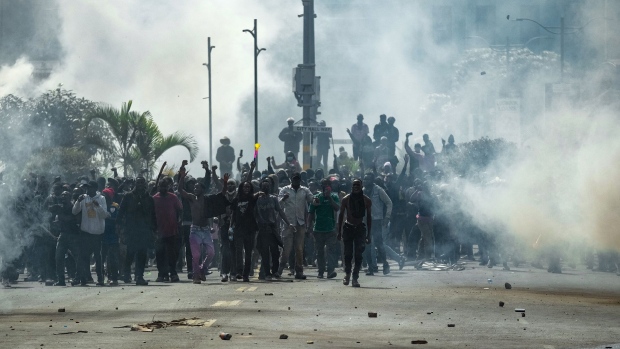Jun 30, 2024
Kenyan President Defends Handling of Deadly Youth Protests
, Bloomberg News

(Bloomberg) -- Kenyan President William Ruto defended his decision to deploy the military to quell nationwide protests over the past two weeks that have left at least 24 people dead.
Protesters stormed the National Assembly on June 25 just after lawmakers approved a contentious tax bill that Ruto maintains would have helped him raise money for expenditure such as employment of thousands of teachers and to write off debts owed by coffee and sugarcane farmers.
Ruto said the demonstrations — against the government’s plan to raise $2.3 billion of new taxes — were infiltrated by criminals who made a beeline for the parliament’s armory when hundreds of protesters overwhelmed security. They also set on fire part of the legislature buildings, the chief justice’s offices and City Hall.
The president initially termed the actions treasonous and deployed the military to prevent further violence, before withdrawing support for the offending legislation.
“I mean, what choice did I have?” Ruto said in a televised round-table with Kenyan media on Sunday night. “I have no blood on my hands,” when asked about the deaths, including of a 12 year-old school boy in the outskirts of the capital, Nairobi.
Sign up here for the twice-weekly Next Africa newsletter
Kenyan police did the best they could, the president said, adding that his administration would investigate the use of live ammunition and that the military would remain on the streets as a last resort. Property worth about 2.4 billion shillings ($18.6 million) was destroyed on the day, according to Ruto.
The marches are expected to continue on Tuesday and Thursday.
“I don’t want to be the leader that took the country in the wrong direction,” he said.
The anti-tax protests that started on June 18 have morphed into an anti-government movement mainly of young people calling for Ruto to step down. While he promised a face-to-face forum to discuss the grievances - which now include ingrained corruption, wastage of public resources and flagrant displays of ostentatious wealth by officials - protesters prefer to remain leaderless, demanding instead that Ruto faces them on an X Spaces.
“If they want me to engage them on X, I will be there,” he said Sunday, promising austerity including doing away with budget allocations for the first lady’s office and for his advisers.
Difficult Position
In a bid to keep funds flowing from a $3.6 billion International Monetary Fund program agreed three years ago, Kenya’s government has been implementing fiscal reforms that include increasing tax rates. Ruto’s administration also has had the additional pressure of having to settle maturing debt procured in the previous regime.
Extensive tax measures introduced last year including a new housing levy and a five percentage point tax increase for the highest income bracket have earned him the derisive moniker, Zakayo: Swahili for the Biblical tax collector Zaccheus.
“I don’t mind being called Zakayo, it is a sacrifice worth making,” Ruto said.
In the fiscal year ended June, about 48% of the 2.3 trillion shillings Kenya raised went into debt financing and another 43% was for salaries. The National Treasury had to borrow for allocations to counties and for school education, Ruto said.
With the new tax bill now scrapped, the government may have to ramp up its planned borrowing for the fiscal year that started on Monday, Ruto said.
“What we have done with the Finance Bill going down, is that instead of borrowing 600 billion, we are going to borrow 600 billion plus 346 billion, that is close to a trillion,” Ruto said. “We are in a very difficult financial position. This is something that the people of Kenya must understand.”
You can follow Bloomberg’s reporting on Africa on WhatsApp. Sign up here.
©2024 Bloomberg L.P.







